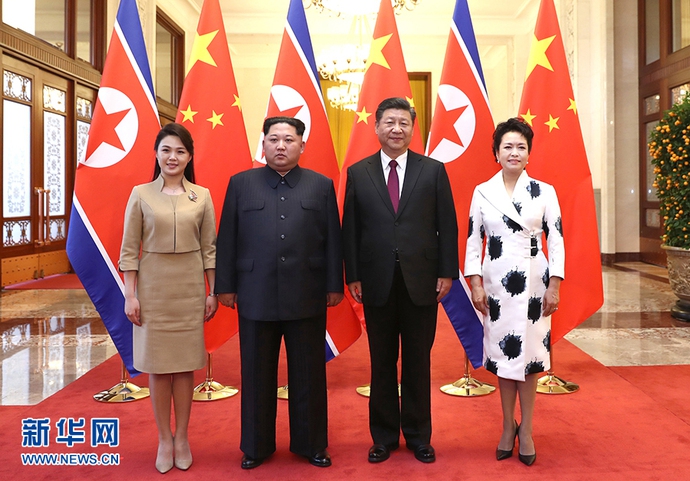 |
|
North Korean leader Kim Jong-un and his wife Ri Sol-ju pose for a commemorative photo prior to a lavish banquet with Chinese President Xi Jinping and his wife Peng Liyuan following the two leaders’ summit on Mar. 26. The photo was issued by Chinese state media on Mar. 28. (Xinhua)
|
Commitment to play a lead role combined with concerns over being bypassed in Korean Peninsula affairs were secondary considerations
Chinese President Xi Jinping’s surprise meeting with North Korean leader Kim Jong-un is being read as signaling his commitment to playing a leading role and preventing China from being bypassed on Korean Peninsula issues. It also appears to tie in with China’s uneasy relations with the US amid the recent “trade war” and the US’s passage of the Taiwan Travel Act. It’s a situation that requires efforts from Beijing to improve its ties with North Korea. As Pyongyang and Beijing’s ties reached an all-time low with North Korea’s nuclear and missile development programs and China’s participation in sanctions, fears mounted in China that the country was losing its influence on Korean Peninsula matters. Some had begun to argue that Beijing was being “bypassed,” noting that it did not figure into recent announcements of planned inter-Korean and North Korea-US summits. It was in this context that Kim held a first summit with Xi ahead of his upcoming meetings with South Korean President Moon Jae-in and US President Donald Trump. From China’s perspective, it was a way of putting paid to speculation that North Korea might slip away from its influence and join the curbs against it as a US ally, while reaffirming the solid condition of its traditional relationship with Pyongyang. It’s a signal that Beijing is moving quickly to smooth over a bilateral relationship that had been consistently prickly since Xi came to power in late 2012. Both sides appear to have moved quickly behind the scenes to organize the summit. Some have claimed that Chinese authorities recently issued an order against criticizing North Korea as part of its bid to restore ties. In editorials on Mar. 18, the Global Times abruptly adopted a laudatory tone on North Korea, calling it a “country worthy of respect” and “the kind of advanced autonomous and independent country that is extremely difficult to find in Northeast Asia.” In their messages to the international community, Chinese authorities have stated that they welcome any kind of interactions among parties involved in resolution of the North Korean nuclear issue and other Korean Peninsula concerns. They have been especially supportive of interaction between North Korea and the US as the “two parties most directly involved in the North Korean nuclear issue.” At the same time, they have stressed Beijing’s own role, arguing that with China’s role as chair nation for the Six-Party Talks on the North Korean nuclear issue, it will have to be involved in the framework eventually. China’s wide-ranging diplomatic efforts with other Six-Party Talks countries around the same time as its North Korea summit can be read along similar lines. CPC Central Committee Political Bureau member Yang Jiechi, considered the top “control tower” in Chinese diplomacy, reportedly planned to arrive in South Korea on Mar. 28 for a two-day visit and meeting with Blue House National Security Office director Chung Eui-yong, after which he is scheduled to travel to the US. Chinese State Councilor and Foreign Minister Wang Yi arrived in Russia on Mar. 27 for a two-day visit as a special envoy for Xi Jinping. A press release by the Chinese Foreign Ministry said Wang was scheduled to meet with Russian President Vladimir Putin and Foreign Minister Sergey Lavrov. With a trilateral South Korea-China-Japan summit being pushed for early May, interaction with Japan also appears to be imminent. With this, China has been using the full range of senior-level channels with the other parties in the Six-Party Talks framework – South and North Korea, the US, Russia, and Japan – in its rapid push to reclaim its leading role in Korean Peninsula diplomacy. Its actions can also be viewed as “second-phase diplomacy”: greeting the US trade war by officially launching a new leadership with intensified central authority put in place by Xi over the past five months with the CCP’s 19th National Congress and National People’s Congress. Stressing China’s pursuit of “great power diplomacy with Chinese characteristics” in a National Congress report last October, Xi announced plans for China to “deepen relations with its neighbors in accordance with the principle of amity, sincerity, mutual benefit, and inclusiveness and the policy of forging friendship and partnership with its neighbors” and “continue to play its part as a major and responsible country.” By Kim Oi-hyun, Beijing correspondent Please direct questions or comments to [english@hani.co.kr]






